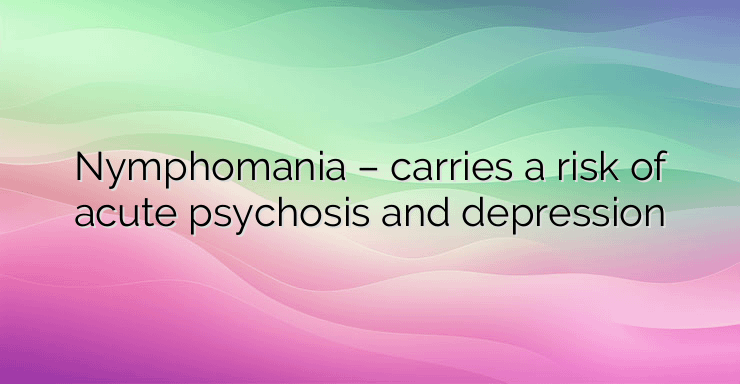A long-discussed case study is whether increased excitability in a woman can occur as a result of a hormonal imbalance or some obstetric-gynecological disorder. According to specialists in sexual medicine, the causes of the development of hypersexual syndrome are based in special centers of the brain and carry out their activity with complex and currently poorly studied processes. The relationship between hormones and the sexuality of each individual has long been proven. But according to experts, hypersexuality cannot be tied in a close relationship with the pronounced hormonal escalation or other imbalance. Rather, it is due to impaired body tolerance and central nervous system response to hormonal production by the gonads. This is also the main reason why women with absolutely healthy reproductive organs, even those without any anamnestic data of gynecological suffering, can suffer from the syndrome of expressed hypersexuality. However, in the conditions of modern life, the line between normality and disease in relation to sexuality is particularly thin, and it is easy to make the wrong diagnosis in some people. For example, it is normal for young boys and girls to have pronounced hypersexuality, which does not mean at all that in adulthood they will respond in the same way to their hormonal production in the body. In practice, hypersexuality is considered a disease state or an acute crisis only when it begins to cause suffering and trouble for a person. There are cases, for example, in which men and women have such an increased libido and desire for sex that it provides a certain disadvantage for maintaining a serious relationship with one sexual partner. Also, some people feel discomfort because of their increased sex drive. In sexopathology – a science that studies deviations in sexual development, one can meet a disease called nymphomania, which occurs with a very increased libido, highly pronounced promiscuity, as well as a lack of any pleasure from sex, which leads people to the state of acute psychoses. mania or depression. The main symptoms in the development of hypersexuality syndrome are an increase in libido, a constant desire for sex, undertaking risky sexual intercourse, promiscuity, the development of sexually transmitted diseases, frequent occurrence of depressive crises, manic disorders and acute psychotic complications. A leading symptom in the anamnesis of this type of patient is that they cannot have a serious sexual partner, because sooner or later everyone loses their initial sexual interest and cannot share the sexual pace. Often, promiscuous behavior and hypersexuality syndrome lead patients to become asocial and withdrawn. Often, such patients end long-standing friendships with loved ones and often share that no one can understand them. What should people do who are worried about their increased sex drive? NEWS_MORE_BOX Increased libido,or hypersexuality, can only be considered a disease when patients seek help for their problem. In the beginning, the treatment can be carried out with psychotropic drugs or hormone therapy. Examinations are prescribed by a specialist in sexual medicine. For ladies who are worried about their increased sexual desire, it is appropriate to seek a consultation with a psychotherapist as soon as possible, who, if he decides, will refer the case to a psychiatrist. The latter specialist additionally recommends a study of hormonal production and a careful examination of the reproductive organs for deviations. Another common sexual disorder is the appearance of frigidity. Frigidity is a psychiatric illness that can be controlled quickly and easily only if any birth trauma leading to impaired or absent production of sex hormones is denied. Often, frigidity, as a sexual disorder, can occur with symptoms of vaginismus – painful contraction of the vagina when trying to have intercourse, as well as the development of painful intercourse syndrome – absent secretion from the vaginal walls, caused by disturbances in the perception of central hormones level leading to injury, bleeding and severe pain during intercourse.


Leave a Reply